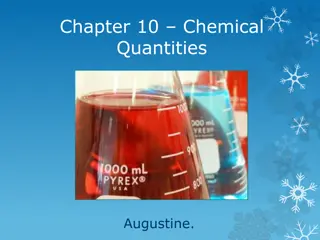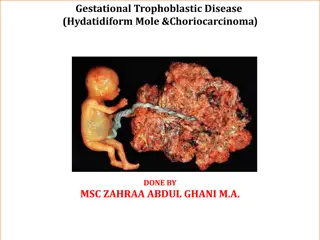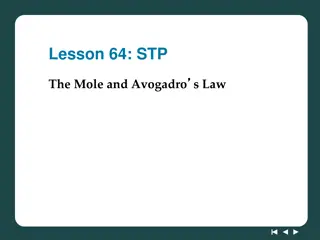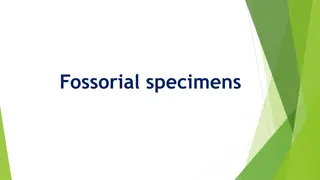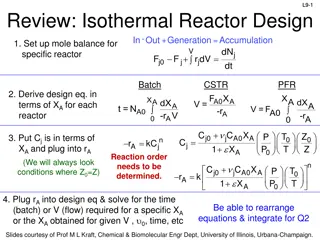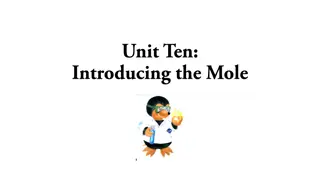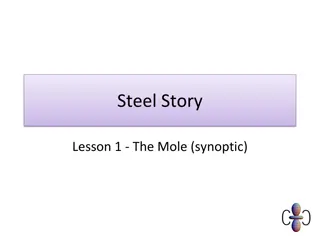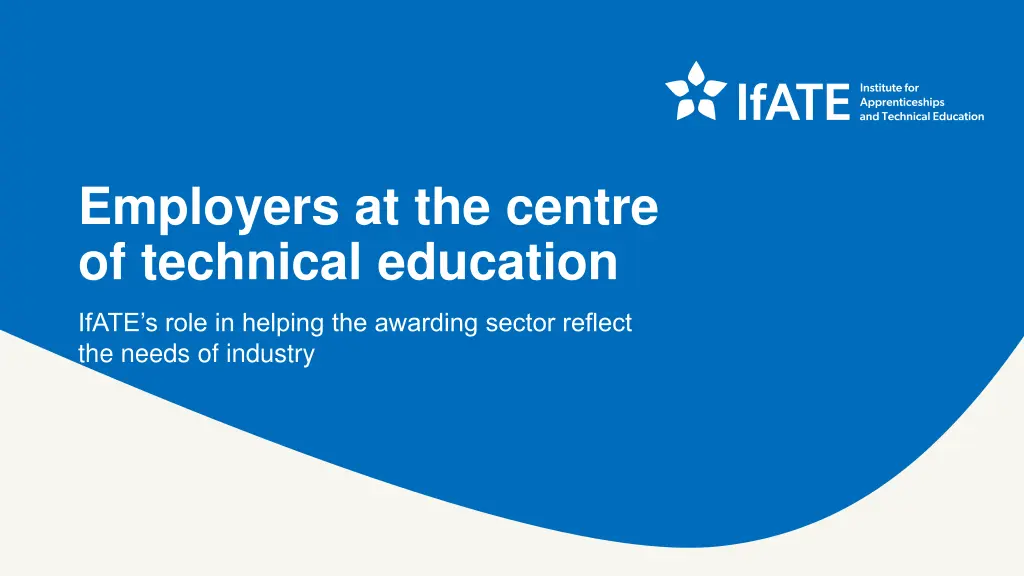
Enhancing Technical Education through Industry Collaboration
Our mission at IfATE is to empower employers to co-create high-quality apprenticeships and technical qualifications, ensuring both employers and individuals receive the necessary skills for success. We work closely with various stakeholders to develop, approve, and review apprenticeship standards, quality assurance, and more. The new qualification landscape at Level 3 offers different types of technical qualifications to support skilled employment and further training, aligning with occupational standards. Join us in simplifying and improving the publicly funded learning options for learners and employers.
Download Presentation

Please find below an Image/Link to download the presentation.
The content on the website is provided AS IS for your information and personal use only. It may not be sold, licensed, or shared on other websites without obtaining consent from the author. If you encounter any issues during the download, it is possible that the publisher has removed the file from their server.
You are allowed to download the files provided on this website for personal or commercial use, subject to the condition that they are used lawfully. All files are the property of their respective owners.
The content on the website is provided AS IS for your information and personal use only. It may not be sold, licensed, or shared on other websites without obtaining consent from the author.
E N D
Presentation Transcript
Employers at the centre of technical education IfATE s role in helping the awarding sector reflect the needs of industry
Our mission is to enable employers to co-create high-quality, cost-effective apprenticeships and technical qualifications, so that every employer and individual gets the skills they need to succeed.
Who do we work with? creation, approval and review of apprenticeship standards and TQs quality assurance of EPA funding recommendations oversight Skills policy legislation budget RoEPAO RoATP apprenticeship service TL work placements marketing apprenticeships liaison with schools and employers All IfATE s work is guided by thousands of employers regulation of awarding organisations inspection of delivery http://tse1.mm.bing.net/th?id=OIP.M6be350723ef8438897bfa184d0b19277o0w=203h=162c=0pid=1.9rs=0p=0r=0 http://tse1.mm.bing.net/th?id=OIP.M5f856a1a1fbc372b19ee951ecaeb119do0w=300h=255c=0pid=1.9rs=0p=0r=0
The new qualification landscape at Level 3 - Technical Qualifications Route Level 3 qualification types Funding Requirements 16-19 only T Levels Technical qualifications Primarily designed to support progression to skilled employment/ further technical training Aligns to occupational standard Alternative approval test Occupational Entry: Quals delivering competence against an occupational standard not covered by T Levels Additional specialist competence test Builds on occupational standard Additional Specialist: Specialist technical qualifications 16-19 and adult Employer demand test and Ofqual conditions Selectively covers occupational standard Significant outcomes test Cross-Cutting: Smaller technical qualifications offering transferable skills e.g. Health and Safety, Leadership and management Aligns to occupational standard Alternative approval test Occupational Entry: Quals delivering competence against an occupational standard covered by T Levels Adult only Occupational Entry: Quals delivering competence for occupations without a standard but where there is employer demand No link to occupational standard Significant outcomes test
Aim of the reforms Simplify the publicly funded offer for learners and employers. Reduce the number of qualifications publicly funded by DfE Remove overlap for 16-19 years old between T Levels and other qualifications Improve the quality of the qualifications that are publicly funded. Clear, occupationally relevant outcomes for learners and employers Secure employer input into the design and maintenance of qualifications so they are and remain relevant REFORM TRANSITION BAU
Engagement with awarding bodies & sector Following the launch, we began an intensive programme of engagement. To date this has covered: 97 awarding bodies engaged 383 one-to-one meetings conducted 646 questions handled by the Post16 inbox We meet with the AoC Curriculum Reform group & Federation of Awarding Bodies Technical Qual group Other activities we are involved in: FE college implementation workshops Gatsby Foundation workshop on study programme design DfE led forum with FE Commissioners FE college visits Supporting FAB/AoC joint working We issue an information bulletin to all ABs 7
Where are we in the TQ cycles? Cycle 1 Level 3 Cycle 1 Level 2 Cycle 2 Level 3 Cycle 2 Level 2 Preparation for Cycle 3
Validating Employer Demand A coherent approach to engagement Links to occupational standards Employer Demand Drawing on industry reports, skills plans and IfATE publications Evidence of direct engagement 9
Integrating the employer voice They tend to be those who have drawn on existing employer relationships, demonstrating the importance of not just building, but maintaining these links with industry. AOs who have excelled in the process to date have started with a clear plan, based on their understanding of the sector in question. Many have drawn on specifics from skills plans, including MCA / LSIP plans to augment their direct engagement activities. All have made clear to IfATE how employers have had the opportunity to validate the content of the qualification in question.
Augmenting your planning with current IfATE publications Three key toolkits for all stakeholders who develop apprenticeships and technical qualifications: Digital Framework Green Toolkit Equity, Diversity, Inclusion Toolkit These documents provide guidance on how technical qualifications can be shaped with EDI, sustainability, and digital skills in mind. They cover practical suggestions, like green skills to consider for each sector, how to write inclusive KSBs, and 'digital characteristics' across all occupational levels. IfATE has also published guidance for awarding bodies on how to maximise their engagement with employers when designing technical qualifications. This is being republished in Summer 2024, complete with updated and refocused guidance on emerging skills.
Cycle 1 to Cycle 2 - CI MAIN CHANGES Combine pre-sift and sift to one deadline, currently called Health Check Move to full review once confirmed we have all relevant documents, removing HLR as a checkpoint Assumed no happy path, sad path so eliminated any stage crossovers AOs will have a longer timeframe to provide requested documents at the Health Check and FR stage Final decisions completed before Route Panel to streamline process CONTINUING There are still 3 stages to the process and Post-16 team have 3 opportunities to contact the AO to ask for additional information The moderation and review checks by IM, G7, G6 & DD (where appropriate) remain in place to allow consistency and comparison The assessment approach includes IfATE and Ofqual
REFORM TRANSITION BAU Cycle 1 Level 3 Cycle 1 Level 2 Cycle 2 Level 3 Cycle 2 Level 2 Preparation for Cycle 3
IfATEs DEFINITION OF EMERGING SKILLS Emerging Skills Skills, knowledge, or behaviours that have been identified as those which will impact the nature of occupations in the short/medium term (2-5 years). This could be due to political drivers/ priorities or the development of new processes/ technologies. Emerging skills are likely already in use by early adopters/specialist organisations, and likely to transition from existing occupations into new areas. Key drivers Technological change Demographics (aging population) Sustainability / environmental / Societal change Government targets / plans Impact Future Skills: The impact could be a change in the way a role is carried out, a new role being developed or a previous role or task becoming obsolete. It could also be something that applies across one or multiple sectors or be specific to an occupation. We think this skill will be needed Emerging Skills: Current Skills / Established Skill: We know this skill will be needed 14 This skill is needed
Proposed flow for skills insight Data Action Insight Large changes to industry/ occupations (5-year horizon) UFS, Standard Skills Classification, WFH, IfATE s employer insight, other apprenticeships, technical quals Trailblazer review Occupational standards, Skills insight tool: SkillsCompass Wider skills system Data quality Structured data and analysis Employer groups + decision making External and internal data sources System responses Output Automated analysis Human analysis Embedded in Rapid action Dynamic standards response Small incremental changes to industry/ occupations
A responsive model for meeting employer emerging skills needs Below we set out how we will use flexible options, underpinned by occupational standards, to respond to employer need. Flow of data-led insight and content through to standards Skill need identified Rapid action Support the development of short, responsive courses to quickly meet emerging skills needs Provide emerging skills insight to shape new content, approve new technical qualifications, and deliver prioritised updates to apprenticeships Dynamic response Embed into occupational Revise existing and introduce new occupational standards to respond to emerging needs standards
Initial pilots: summer to autumn 2024 Renewable energy: Hydrogen (Engineering & Manufacturing and Construction & Built Environment routes, and more) pilot with the Workforce Foresighting Hub Hydrogen is considered essential to delivering net zero in the UK. It is a clean, low-carbon energy source used in various applications, from heating homes and buildings to powering vehicles and heavy machinery. With hydrogen, the country can reduce its reliance on fossil fuels and move towards a greener, more sustainable future. A Workforce Foresighting Hub cycle is setting out the future skills for hydrogen tank production, transport, and use with broad applicability for a range of routes and occupations where hydrogen use will become more widespread. The resulting articulation of duties and skills, and an assessment of where there may be gaps in current skills provision, will provide rich and detailed insight, and an evidence base to support IfATE decision making on the development and revision of occupational standards. H2 Data/digitally enabled health and social care: virtual wards (Care Services and Health & Science routes) pilot with West Midlands MCA and Black Country NHS Virtual Wards (also known as hospital at home) are a safe and efficient alternative to NHS and social care that usually takes place in a hospital setting and they are enabled by utilising the latest technology. Virtual Wards allow patients to receive care at the place they call home (including care homes) safely and in familiar surroundings, helping speed up their recovery while freeing up hospital beds for patients that need them most. Patients are reviewed daily by the clinical team and the ward round may involve a home visit or take place through video technology. Many virtual wards use technology like apps, wearables and other medical devices enabling clinical staff to easily check in and monitor the person s recovery. They require increased digital and data analysis capabilities. This pilot will engage with employers, trainers, and educators to gather qualitative evidence for the emerging skills needs of the health and social care workforce, with particular focus on occupations held on IfATE s occupational maps, in order to provide rich and detailed insight, and an evidence base to support IfATE decision making on the development and revision of occupational standards. Advanced shipbuilding techniques (Engineering & Manufacturing, Construction & Built Environment, and Transport & Logistics routes) pilot with the Workforce Foresighting Hub Shipbuilding techniques including automated equipment, advanced robotics and interactive 3D models (digital twins) are transforming the global shipbuilding industry. Decarbonisation and operational efficiency through automation are key priorities for the UK maritime sector. Technological advancements, environmental concerns, and a shifting global market are changing the way ships are built and the skills the workforce needs. A Workforce Foresighting Hub cycle, with BAE as a key sponsor, is setting out to identify the shipbuilding skills of tomorrow. The resulting articulation of duties and skills, and an assessment of where there may be gaps in current skills provision, will provide rich and detailed insight, and an evidence base to support IfATE decision making on the development and revision of occupational standards.
Working with you: What insight will provide you with the best evidence of demand and viability for new/revised qualifications? What is the best way to present that insight and make it available? What options may there be to allow increased flexibility within qualifications to meet emerging skills or other demand? How can IfATE work with AOs to consider these questions?
Insights we need from you Draft Qs for consideration: - when in the year do you need these insights? - what do you need to know from us to support: Planning process Development process Evaluation process 19

